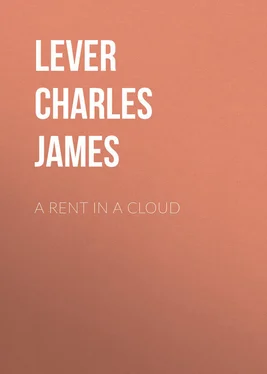Charles Lever - A Rent In A Cloud
Здесь есть возможность читать онлайн «Charles Lever - A Rent In A Cloud» — ознакомительный отрывок электронной книги совершенно бесплатно, а после прочтения отрывка купить полную версию. В некоторых случаях можно слушать аудио, скачать через торрент в формате fb2 и присутствует краткое содержание. Жанр: literature_19, foreign_antique, foreign_prose, на английском языке. Описание произведения, (предисловие) а так же отзывы посетителей доступны на портале библиотеки ЛибКат.
- Название:A Rent In A Cloud
- Автор:
- Жанр:
- Год:неизвестен
- ISBN:нет данных
- Рейтинг книги:5 / 5. Голосов: 1
-
Избранное:Добавить в избранное
- Отзывы:
-
Ваша оценка:
- 100
- 1
- 2
- 3
- 4
- 5
A Rent In A Cloud: краткое содержание, описание и аннотация
Предлагаем к чтению аннотацию, описание, краткое содержание или предисловие (зависит от того, что написал сам автор книги «A Rent In A Cloud»). Если вы не нашли необходимую информацию о книге — напишите в комментариях, мы постараемся отыскать её.
A Rent In A Cloud — читать онлайн ознакомительный отрывок
Ниже представлен текст книги, разбитый по страницам. Система сохранения места последней прочитанной страницы, позволяет с удобством читать онлайн бесплатно книгу «A Rent In A Cloud», без необходимости каждый раз заново искать на чём Вы остановились. Поставьте закладку, и сможете в любой момент перейти на страницу, на которой закончили чтение.
Интервал:
Закладка:
An old uncle, a brother of his mother’s, who was his guardian, would once on a time have stood by him, but he had forfeited his good esteem by an act of deception with regard to money, which the old man could not forgive. “Be it so,” said he; “I deemed my friendship for you worth more than three hundred pounds. You, it would seem, are differently minded; keep the money and let us part.” And they did part, not to meet again. Calvert’s affairs were managed by the regimental agent, and he thought little more of an old relative, who ceased to hold a place in his memory when unassociated with crisp inclosures “payable at sight.”
“I wonder what would come of it if I were to write to him; if I were to put it to his humanity to rescue me from a climate where, after all, I might die – scores of fellows die out there. At all events, I detest it. I could say, ‘My leave expires in October, if you would like to see me once more before I quit England for ever, for I am going to a pestilential spot – the home of the ague and jungle fever, and Heaven knows what else – your sister’s son – poor Sophy’s child.’ That ought to touch him.” And then he went on to think of all the tender and moving things he could write, and to picture to himself the agitation of him who read them; and thus speculating, and thus plotting, he swept his light boat along till she came close in to shore, and he saw the little villa peeping through the spray-like branches of a weeping ash that stood beside it “Higher up,” cried a voice, directing him. “Don’t you know the landing-place yet?” And, startled by a voice not altogether strange to him, he looked round and saw the old lady of the Rhine steamer, the same who had snubbed him at Coblentz, the terrible Miss Grainger of the lost writing-case. It was some minutes before he remembered that he was performing the part of boatman, and not appearing in his own character. Resolved to take all the benefit of his incognito, he lifted his hat in what he fancied to be the true Italian style, and taking a basket in each hand, followed the old lady to the house.
“It is three days that we have been expecting you,” said she, tartly, as she walked briskly on, turning at times to point a sarcasm with a fierce look. “You were punctual enough on Tuesday last, when you came for your rent. You were to the very minute then, because it suited yourself. But you are like all your countrymen – mean, selfish, and greedy. As to those pears you brought last, I have struck them off the account. You may bring others if you please, but I’ll not pay for rotten fruit any more than I will for three journeys to Como for nothing – do you hear me, Sir? three journeys to look after my writing-desk, which I lost on the Rhine, but which I know was forwarded here, though I can’t get it. Is it worth your while to answer? Oh, of course, your old excuse – you are forgetting your English – it is so long since you were a courier. You knew quite enough, when I came here, to make me pay more than double the proper rent for this miserable place, with out a carpet, or – ” Just as she readied thus tar, she was joined by one of the young girls, whose looks had vastly changed for the better, and was now a strikingly fine and handsome girl.
“Milly,” said the old lady, “take this man round by the kitchen garden, and get some one to take the fruit from him, and be sure you count the melons.”
Not sorry for the change of companionship, Calvert followed Milly, who, not condescending to bestow a look on him, moved haughtily on in front.
“Leave your baskets yonder, my good man,” said she, pointing to a bench under a spreading fig-tree; and Calvert, depositing his burden, drew himself up and removed his hat. “My aunt will pay you,” said she, turning to go away.
“I’d far rather it had been the niece,” said he, in English.
“What do you mean? Who are you?”
“A stranger, who, rather than suffer you to incur the privation of a breakfast without fruit, rowed across the lake this morning to bring it.”
“Won’t he go, Milly? What is he bargaining about?” cried Miss Grainger, coming up.
But the young girl ran hastily towards her, and for some minutes they spoke in a low tone together.
“I think it an impertinence – yes, an impertinence, Milly – and I mean to tell him so!” said the old lady, fuming with passion. “Such things are not done in the world. They are unpardonable liberties. What is your name, Sir?”
“Calvert, Madam.”
“Calvert? Calvert? Not Calvert of Rocksley?” said she, with a sneer.
“No, Ma’am, only his nephew.”
“Are you his nephew, really nis nephew?” said she, with a half incredulity.
“Yes, Madam, I have that very unprofitable honour, if you axe acquainted with the family, you will recognise their crest;” and he detached a seal from his watch-chain and handed it to her.
“Quite true, the portcullis and the old motto, ‘Ferme en Tombant’ I know, or rather I knew your relatives once, Mr. Calvert;” this was said with a total change of manner, and a sort of simpering politeness that sat very ill upon her.
Quick enough to mark this change of manner and profit by it, he said, somewhat coldly, “Have I heard your name, Madam? Will you permit me to know it?”
“Miss Grainger, Sir. Miss Adelaide Grainger” – reddening as she spoke.
“Never heard that name before. Will you present me to this young lady?” And thus with an air of pretension, whose impertinence was partly covered by an appearance of complete unconsciousness, he bowed and smiled, and chatted away till the servant announced breakfast.
To the invitation to join them, he vouchsafed the gentlest bend of the head, and a half smile of acceptance, which the young lady resented by a stare that might have made a less accomplished master of impertinence blush to the very forehead. Calvert was, however, a proficient in his art.
As they entered the breakfast-room, Miss Grainger presented him to a young and very delicate-looking girl who lay on a sofa propped up by cushions, and shrouded with shawls, though the season was summer.
“Florence, Mr. Calvert Miss Florence Walter. An invalid come to benefit by the mild air of Italy, Sir, but who feels even these breezes too severe and too bracing for her.”
“Egypt is your place,” said Calvert; “one of those nice villas on the sea slope of Alexandretta, with the palm-trees and the cedars to keep off the sun;” and seating himself by her side in an easy familiar way, devoid of all excess of freedom, talked to her about health and sickness in a fashion that is very pleasant to the ears of suffering. And he really talked pleasantly on the theme. It was one of which he had already some experience. The young wife of a brother officer of his own had gained, in such a sojourn as he pictured, health enough to go on to India, and was then alive and well, up in the Hill country above Simlah.
“Only fancy, aunt, what Mr. Calvert is promising me – to be rosy-cheeked,” said the poor sick girl, whose pale face caught a slight pinkish tint as she spoke. “I am not romancing in the least,” said Calvert, taking his place next Milly at the table. “The dryness of the air, and the equitable temperature, work, positively, miracles;” and he went on telling of cures and recoveries. When at last he arose to take leave, it was amidst a shower of invitations to come back, and pledges on his part to bring with him some sketches of the scenery of Lower Egypt, and some notes he had made of his wanderings there.
“By-the-way,” said he, as he gained the door, “have I your permission to present a friend who lives with me – a strange, bashful, shy creature, very good in his way, though that way isn’t exactly my way; but really clever and well read, I believe. May I bring him? Of course I hope to be duly accredited to you myself, through my uncle.”
Читать дальшеИнтервал:
Закладка:
Похожие книги на «A Rent In A Cloud»
Представляем Вашему вниманию похожие книги на «A Rent In A Cloud» списком для выбора. Мы отобрали схожую по названию и смыслу литературу в надежде предоставить читателям больше вариантов отыскать новые, интересные, ещё непрочитанные произведения.
Обсуждение, отзывы о книге «A Rent In A Cloud» и просто собственные мнения читателей. Оставьте ваши комментарии, напишите, что Вы думаете о произведении, его смысле или главных героях. Укажите что конкретно понравилось, а что нет, и почему Вы так считаете.












